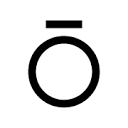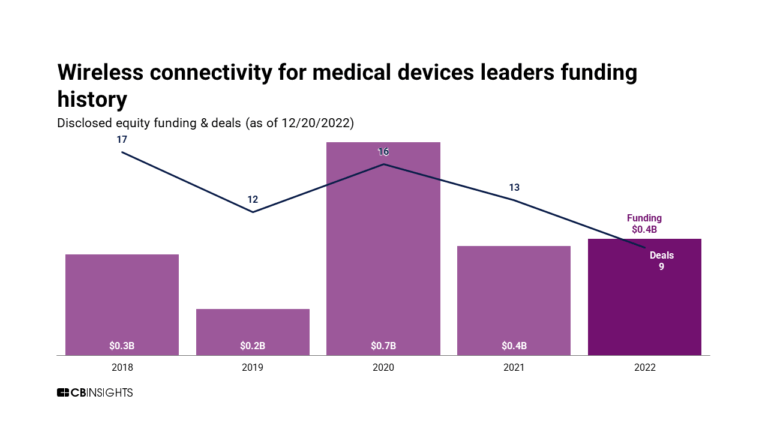
Withings
Founded Year
2008Stage
Series B | AliveTotal Raised
$95.98MLast Raised
$62.18M | 4 yrs agoAbout Withings
Withings is a company that focuses on connected health technology in the healthcare industry. The company offers a range of products including smart scales, hybrid watches, blood pressure monitors, and sleep analyzers, all designed to provide medical-grade measurements at home. These products primarily cater to the healthcare and wellness sectors. It was founded in 2008 and is based in Issy-les-Moulineaux, France.
Loading...
ESPs containing Withings
The ESP matrix leverages data and analyst insight to identify and rank leading companies in a given technology landscape.
The consumer wearables & biosensors market offers solutions for individuals to monitor various aspects of their health. These devices can track a wide range of metrics such as heart rate, sleep quality, activity levels, and even blood glucose levels, providing users with insights into their health. Additionally they can be used to track and manage chronic conditions like diabetes, heart disease, a…
Withings named as Outperformer among 15 other companies, including Google, Abbott, and Samsung Electronics.
Loading...
Research containing Withings
Get data-driven expert analysis from the CB Insights Intelligence Unit.
CB Insights Intelligence Analysts have mentioned Withings in 2 CB Insights research briefs, most recently on Aug 21, 2024.

Aug 21, 2024
The clinical trials tech market mapExpert Collections containing Withings
Expert Collections are analyst-curated lists that highlight the companies you need to know in the most important technology spaces.
Withings is included in 6 Expert Collections, including Smart Cities.
Smart Cities
1,307 items
Smart building tech covers energy management/HVAC tech, occupancy/security tech, connectivity/IoT tech, construction materials, robotics use in buildings, and the metaverse/virtual buildings.
Value-Based Care & Population Health
1,067 items
The VBC & Population Health collection includes companies that enable and deliver care models that address the health needs for defining populations along the continuum of care, including in the community setting, through participation, engagement, and targeted interventions.
Conference Exhibitors
5,302 items
Smart Home & Consumer Electronics
1,234 items
This Collection includes companies developing smart home devices, wearables, home electronics, and other consumer electronics.
Digital Health
11,072 items
The digital health collection includes vendors developing software, platforms, sensor & robotic hardware, health data infrastructure, and tech-enabled services in healthcare. The list excludes pureplay pharma/biopharma, sequencing instruments, gene editing, and assistive tech.
Telehealth
2,918 items
Companies developing, offering, or using electronic and telecommunication technologies to facilitate the delivery of health & wellness services from a distance. *Columns updated as regularly as possible; priority given to companies with the most and/or most recent funding.
Withings Patents
Withings has filed 84 patents.
The 3 most popular patent topics include:
- sensors
- cardiac arrhythmia
- cardiac electrophysiology

Application Date | Grant Date | Title | Related Topics | Status |
|---|---|---|---|---|
4/30/2021 | 3/26/2024 | Respiratory physiology, Monoclonal antibodies, Respiratory therapy, Cardiology, Blood | Grant |
Application Date | 4/30/2021 |
|---|---|
Grant Date | 3/26/2024 |
Title | |
Related Topics | Respiratory physiology, Monoclonal antibodies, Respiratory therapy, Cardiology, Blood |
Status | Grant |
Latest Withings News
Sep 19, 2024
A comparison of Fitbit, Garmin, Apple, Oura, and Withings A young lady exercising outdoors is looking at her fitness tracker watch. Today, keeping track of your health is more within reach than ever with the widespread distribution and use of wearable fitness trackers. But how accurate is your health device? Are you really getting those 10k steps a day, or did you really burn that many calories in your morning 5K run? Guava Health explores the accuracy of activity trackers produced by the five leading fitness tracker companies—Fitbit, Garmin, Apple, Oura, and Withings—to understand how reliable the data from wearable devices is and how effectively they can be used to monitor health behaviors. Please note that the compilation of data will rely on information published in peer-reviewed journals. This is due to the fact that manufacturers are not legally obligated to disclose accuracy testing unless their products are classified as medical devices. If you are still experiencing decision fatigue when it comes to choosing your device, check out this article to help you narrow down your selection. How accurate is the Fitbit? While step counting is a specialty of Fitbit devices, a review of 67 studies revealed some variations in accuracy. On treadmills, Fitbits tended to underestimate steps, while in real-life scenarios, they often overestimated them. Overall, however, these discrepancies were generally considered acceptable. Despite its success in step counting, Fitbit’s energy expenditure measurements were less accurate, particularly for higher-intensity activities, and it often underestimated distance during faster walking. Additionally, while Fitbit’s sleep tracking aligns closely with some research-grade tools, a more recent 2023 study found that the Fitbit Inspire 2 overestimates vital sleep metrics when pitted against the gold standard. Compared to polysomnography (PSG) tests, researchers saw these overestimations for total sleep time, deep sleep, and REM. When it comes to cardiovascular health, the Fitbit Charge does pretty well. It only slightly overestimates VO2 max and slightly underestimates heart rate (HR), but becomes more accurate with increased activity. VO2 max is an important indicator of cardiovascular fitness. It measures the amount of oxygen your body can take up during exercise, so it tends to be higher in individuals who do a lot of aerobic activity, like running or swimming. Accurately tracks: Steps, VO max, and sleep (sort of) Inaccurately tracks: Distance and energy expenditure How accurate is the Garmin watch? In a comprehensive review of 32 studies from 2020, Garmin activity trackers demonstrated high accuracy in tracking steps, but limited studies were available for assessing speed, elevation, and sleep tracking. When it comes to distance accuracy, Garmin watches seem to overestimate distances at slow treadmill speeds and underestimate at high speeds. Furthermore, the accuracy of energy expenditure and HR tracking was found to be comparatively lower than that of other health trackers. A study from 2021 revealed that the Garmin Forerunner accurately predicted VO2 max, although there was notable variation among the group of 44 individuals. Accurately tracks: Steps and VO2 max Inaccurately tracks: Energy expenditure, distance, heart rate, and sleep How accurate is the Apple Watch? A review from 2020 shows the Apple Watch to be highly accurate as a fitness tracker when measuring daily step counts, particularly at a moderate intensity level. However, this preciseness fluctuated with the device overestimating at slower walking speeds and underestimating at faster ones. The review also found that energy expenditure was overestimated by the Apple Watch. While formal research from this 2019 study hasn’t been shared discussing heart rate in healthy patients, researchers found that for patients with cardiovascular disease, the Apple Watch HR during exercise was accurate. This work was promising for potential use in HR-guided training programs for cardiac rehabilitation. Additionally, according to a 2021 report by Apple , the watchOS 7 and later models allow users to note if they’re on heart rate-limiting medications, which modifies the algorithm used to calculate VO2 max, ensuring more accurate results. Accurately tracks: Steps, heart rate, and VO2 max Inaccurately tracks: Energy expenditure and speed How accurate is the Oura Ring? The Oura Ring stands out for its precision in sleep tracking, nighttime heart metrics, and body temperature, offering insights into readiness and overall wellness. This 2024 study published in the Journal of Clinical Sleep Medicine serves as a testament to Oura’s sleep measurements, as it performed impressively well next to medical-grade sleep study tracking results. A study from 2020 indicates it’s also great at reading nocturnal heart health metrics, but little research has been done to assess its daytime accuracy. Research does indicate, however, that when it comes to step counting and energy expenditure, it may be suboptimal. In 2023, this study concluded that while it can detect sweeping changes in energy expenditure, it became less sensitive as activity intensity increased. The ring struggles with step counting due to its position on the finger, often mistaking hand movements for steps. Additionally, without GPS, it cannot accurately track distance or speed unless paired with a phone. Oura rings also track VO2 max, but a blog post by Oura explains that it’s a “broad estimate” and it won’t be as accurate as lab measurements. Accurately tracks: Sleep, nighttime heart rate variability and heart rate, body temperature Inaccurately tracks: Steps, distance, speed How accurate is the Withings watch? A recent study demonstrated a strong correlation between estimated steps from the Withings watches and those obtained using devices widely considered gold standards for step and activity estimation. Additionally, the Withings tended to assess relative energy expenditure levels with exceptional accuracy. Likewise, recent research suggests that while the Withings showed acceptable accuracy in measuring HR for general consumer use, it may not be suitable for situations requiring more precise HR measurements, such as healthcare or clinical trials. Notably, the Withings displayed lower accuracy in measuring HR during mobile activities like walking, gardening, and household tasks, compared to more sedentary activities such as desk work, eating or drinking, and sitting. According to Withings, the ScanWatch does measure VO2 max, however, there’s been no research published on its accuracy, so it’s safe to assume it’s not medical grade. Accurately tracks: Energy expenditure, heart rate (sedentary), and steps Inaccurately tracks: Heart rate (mobile) Back to the age-old question: How accurate are fitness trackers? In short, they’re not always exact, but they do point us in the right direction. The compilation of research further pushes for the narrative that people should treat these fitness trackers as tools to give them relative information about our overall health. Rather than focusing too deeply on the individual metrics, they should zoom out and focus on the general trends. Health applications can help people visualize and identify patterns in the information their device is tracking around the clock, ultimately supporting them in making more informed health decisions. While this may not have been the answer you wanted to hear, have no fear! This doesn’t mean you should stop aiming to hit your daily 10,000 steps or disregard the metrics entirely. This information just suggests that it is advisable to avoid basing lifestyle and your health decisions solely on these numerical values. This story was produced by Guava Health and reviewed and distributed by Stacker Media.
Withings Frequently Asked Questions (FAQ)
When was Withings founded?
Withings was founded in 2008.
Where is Withings's headquarters?
Withings's headquarters is located at 2 rue Maurice Hartmann, Issy-les-Moulineaux.
What is Withings's latest funding round?
Withings's latest funding round is Series B.
How much did Withings raise?
Withings raised a total of $95.98M.
Who are the investors of Withings?
Investors of Withings include Bpifrance, IDInvest Partners, BNP Paribas Development, Gilde Healthcare, ODDO BHF and 7 more.
Who are Withings's competitors?
Competitors of Withings include NYX, Aktiia, domo.health, Dozee, Empatica and 7 more.
Loading...
Compare Withings to Competitors

MyFitnessPal offers a platform for achieving and maintaining health goals. The company provides a database of foods and exercises, fitness technology partners, and community insights. It was founded in 2005 and is based in Austin, Texas.

Oura is a health technology company focused on personal health and well-being through sleep and activity tracking. The company offers the Oura Ring, a wearable device that monitors various physiological signals to provide insights into sleep patterns and daily activity levels. Oura primarily serves the personal health and wellness sector, with a focus on individuals seeking to enhance their lifestyle and well-being. It was founded in 2013 and is based in Oulu, Finland.

Azumio focuses on AI-driven digital health solutions within the health and wellness technology sector. The company offers a suite of mobile applications and APIs for tracking and managing various health metrics such as diet, fitness, sleep, and diabetes. Azumio primarily serves businesses looking to integrate health and wellness functionalities into their applications. It was founded in 2011 and is based in Redwood City, California.

Whoop focuses on wearable technology designed to enhance human performance within the health and fitness industry. The company offers a wearable device that tracks sleep, strain, recovery, and health metrics to provide personalized insights and recommendations. Whoop primarily serves individuals seeking to improve their personal health and athletic performance. Whoop was formerly known as Bobo Analytics. It was founded in 2012 and is based in Boston, Massachusetts.

Noom offers behavior change courses and a virtual diabetes prevention program that leverages artificial intelligence, mobile technology, and psychology, supported by personal coaching to help individuals improve their health. Noom's platform is utilized by healthcare and pharmaceutical companies to enhance patient treatment outcomes. Noom was formerly known as WorkSmart Labs. It was founded in 2008 and is based in New York, New York.
Health Management Services has developed the wearable fitness tracking device GetActive.
Loading...
